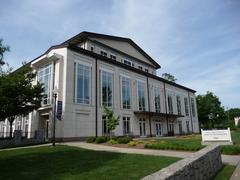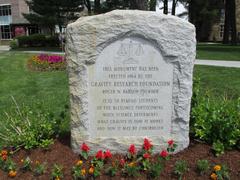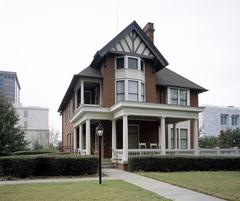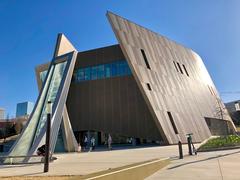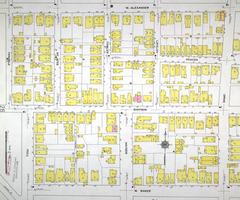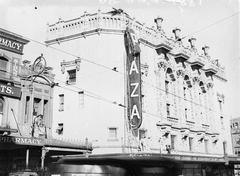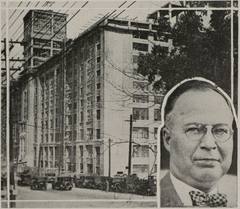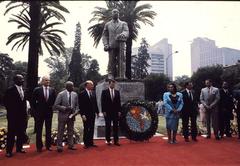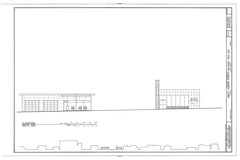
Complete Guide to Visiting The Temple in Atlanta, United States of America: Tickets, Hours, and Visitor Information
Date: 03/07/2025
Introduction
Visiting The Temple in Atlanta is an enriching experience that offers a window into the city’s Jewish heritage, architectural grandeur, and pivotal role in the American civil rights movement. Officially known as the Hebrew Benevolent Congregation, The Temple is Atlanta’s oldest Jewish congregation, with roots tracing back to the 19th century. Its Neoclassical building, designed by Philip Trammell Shutze and completed in 1931, is both an architectural gem and a symbol of the resilience and cultural contributions of Atlanta’s Jewish community (Georgia Historical Society; Hadassah Magazine).
The Temple’s legacy extends beyond its architecture. During the civil rights era, it became a center of social justice advocacy under Rabbi Jacob M. Rothschild, withstanding adversity such as the 1958 bombing and emerging as a beacon of tolerance and interfaith cooperation (Atlanta History Center; Southern Spaces). Conveniently located in Midtown Atlanta, The Temple is easily accessible and situated near other major attractions, making it a must-visit for those interested in the city’s vibrant history and diverse culture (Discover Atlanta; GPSmyCity).
Table of Contents
- Historical Overview
- Visitor Information
- Social Justice and Civil Rights Legacy
- Community Engagement and Cultural Significance
- Recognition and Preservation
- The Temple Today
- Frequently Asked Questions (FAQ)
- Conclusion
- References and Useful Links
Historical Overview
Founding and Early Development
The Temple began as the Hebrew Benevolent Society in 1860, serving Atlanta’s growing population of German-Jewish immigrants in need. By 1867, it was established as Atlanta’s first organized Jewish congregation and soon built its first permanent worship space in downtown Atlanta (Georgia Historical Society; Wikipedia).
Architectural Evolution
In 1931, The Temple moved to its current Neoclassical building, designed by Philip Trammell Shutze. Inspired by King Solomon’s Temple, the structure features symbolic elements throughout the foyer and sanctuary, including ornate ceilings, terrazzo floors, and Jewish motifs. The Temple is listed on the National Register of Historic Places (since 1982) and is recognized as an Atlanta Landmark Building (since 1989) (Hadassah Magazine; Wikipedia).
Visitor Information
Visiting Hours and Admission
- Hours: Monday–Friday, 9:00 AM–5:00 PM; Sunday, 10:00 AM–2:00 PM. Hours may vary on holidays—verify on the official website before your visit.
- Admission: Free for general visitors. Donations are appreciated to help support preservation and community outreach.
Accessibility and Travel Tips
- Location: 1589 Peachtree St NE, Midtown Atlanta.
- Accessibility: The Temple is fully wheelchair accessible, with ramps, elevators, and accessible restrooms.
- Parking: Limited on-site parking; additional public garages and street parking nearby. The Midtown MARTA station is within walking distance.
- Public Transportation: Easily accessible via MARTA rail and bus routes.
Guided Tours and Special Events
- Guided Tours: Offered weekly on Saturdays at 2:00 PM and by appointment for groups. Tours cover architectural highlights and civil rights history.
- Special Events: The Temple hosts lectures, concerts, and interfaith events throughout the year. Check the official calendar for upcoming programs.
Social Justice and Civil Rights Legacy
The Temple is renowned for its vital role in the civil rights movement. Under Rabbi Jacob M. Rothschild’s leadership in the 1950s and 1960s, the congregation actively supported racial equality and faced significant opposition, including the notorious 1958 bombing. This attack, which caused major damage but no injuries, galvanized support for civil rights within Atlanta and across the nation (GPB News; Arts & Culture Google). The event and The Temple’s steadfast response remain a crucial chapter in Atlanta’s history of social progress.
The congregation’s activism extended beyond its own community, forming alliances with Black churches and civil rights leaders, including Dr. Martin Luther King Jr., and participating in efforts to integrate Atlanta’s public schools (Atlanta History Center; Southern Spaces).
Community Engagement and Cultural Significance
The Temple functions as a hub for education, interfaith dialogue, and cultural exchange. It offers religious school programs, adult seminars, and public lectures that explore Jewish history, ethics, and social responsibility. Community engagement includes charitable initiatives, social justice advocacy, and citywide service projects such as Mitzvah Day (Hadassah Magazine).
Recognition and Preservation
The Temple’s cultural and historical importance is reflected in its landmark status and close partnership with institutions like the William Breman Jewish Heritage Museum, which offers educational programs and tours highlighting the Jewish experience in Georgia (Discover Atlanta).
The Temple Today
Today, The Temple remains a vibrant center of worship, learning, and action. Visitors are welcomed year-round for tours, services, and community events. The sanctuary’s elegant architecture and ongoing social justice mission make The Temple a powerful symbol of Atlanta’s diversity and resilience (Atlanta.com).
Frequently Asked Questions (FAQ)
Q: What are The Temple’s visiting hours?
A: Monday–Friday, 9:00 AM–5:00 PM; Sunday, 10:00 AM–2:00 PM. Hours may change on holidays.
Q: Is there an admission fee or are tickets required?
A: Admission is free; donations are welcome.
Q: Are guided tours available?
A: Yes, Saturdays at 2:00 PM and by appointment for groups.
Q: Is The Temple wheelchair accessible?
A: Yes, including ramps, elevators, and accessible restrooms.
Q: Where can I park?
A: Limited on-site parking; public garages and street parking nearby.
Q: What else is nearby?
A: The William Breman Jewish Heritage Museum, Martin Luther King Jr. National Historical Park, Atlanta Botanical Garden, and the High Museum of Art.
Conclusion
The Temple in Atlanta stands as a testament to faith, resilience, and the pursuit of justice. With its storied history, architectural brilliance, and enduring commitment to community and social progress, it offers visitors a meaningful and memorable experience. Plan your visit by checking current hours and tour schedules, and immerse yourself in one of Atlanta’s most significant historical landmarks.
For the latest updates, tour bookings, and special events, visit The Temple’s official website and consider downloading the Audiala app for personalized recommendations and insider tips. Discover how The Temple’s legacy continues to inspire Atlanta and enrich your journey through the city’s rich cultural landscape.
References and Useful Links
- Georgia Historical Society
- Wikipedia
- Hadassah Magazine
- Atlanta History Center
- Southern Spaces
- GPB News
- Discover Atlanta
- GPSmyCity
- Arts & Culture Google
- Atlanta.com











